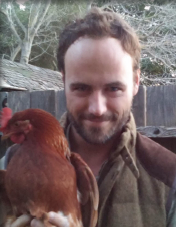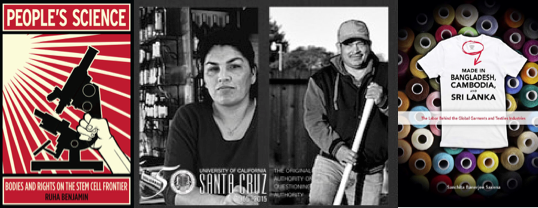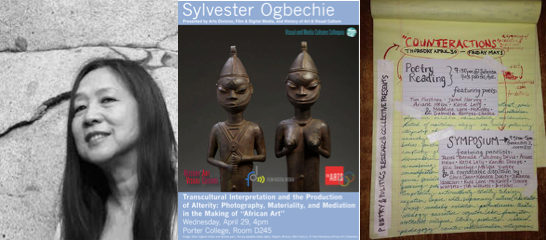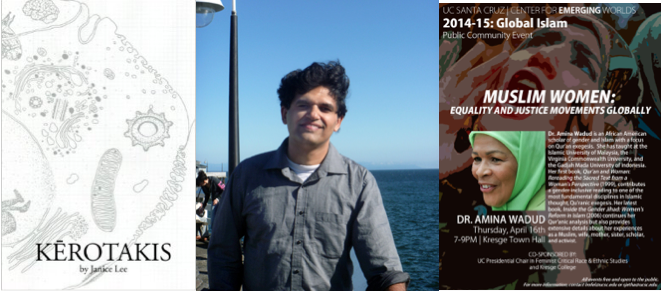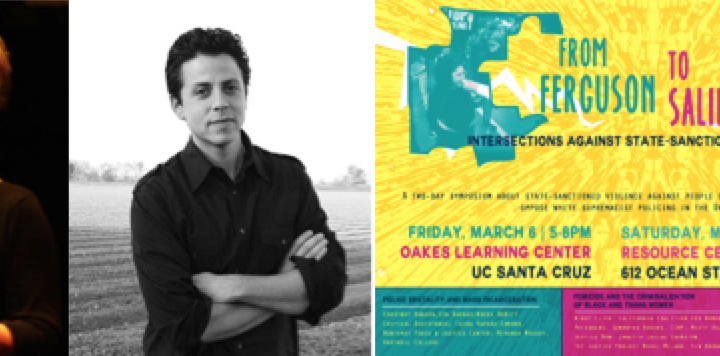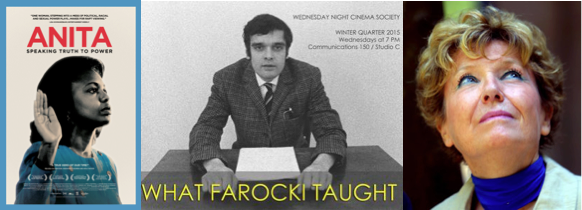* To advertise your unit or department’s event in the “Of Interest” section of this weekly bulletin, please e-mail complete event information in text format (no PDFs) to cult@ucsc.edu no later than noon on Friday of the prior week.
* Additional information and regular updates on “Of Interest” events can be found on the IHR website and on the Cultural Studies website.
OF-INTEREST EVENT DESCRIPTIONS:
Monday, May 11 / SIKH & PUNJABI STUDIES / Dr. Jasjit Singh / “Diasporic Religious Identity in Emerging Adulthood: The Case of British Sikhs” / 12:00-2:00pm / Humanities 1, Room 210
This talk examines processes of religious transmission among members of minority diasporic religious communities, with a focus on British Sikhs. Using ethnographic methods including the first ever large scale online survey of British Sikhs, this paper explores the shift which has occurred for many young South Asians in Diaspora who now identify more closely with a religious as opposed to an ethnic identity. Focusing on a number of different arenas of religious transmission including families, religious institutions and the internet, this paper examines how processes of religious socialisation and familial nurture impact on identity, in particular among young people entering the phase of ‘Emerging Adulthood’ (Arnett 2004).
Dr Jasjit Singh is a research fellow at the University of Leeds based in the School of Philosophy, Religion and the History of Science. His research examines the religious lives of South Asians with a particular focus on understanding processes of religious and cultural transmission among Sikhs in diaspora and the different arenas in which this transmission occurs. To date he has examined the relationship between traditional arenas of religious learning (including the family environment and religious institutions) and newer arenas of transmission including camps, University faith societies and the Internet. He has recently undertaken a project examining the cultural value of South Asian arts and has a growing interest in the role of religious media.
(top)
Monday, May 11 / DIRECTIONS IN DIGITAL HUMANITIES / Fabiola Hanna / “Digital Humanities Working Group / Work-in-Progress Conversation Aesthetics: Imagining Histories of Modern Lebanon, Fabiola Hanna” / 12:15-1:30pm / Humanities 1, Room 202
Hanna will present her recent work, We are History: A People’s History of Lebanon, a digital interface that collects varied oral histories of a people and presents them in a disruptive but dialogical manner. Using contemporary oral histories about the 1981 siege of Zahle, Lebanon, the software is given the goal of generating a narrative from the transcripts of said oral histories.
Fabiola Hanna is a new media artist, software designer and activist currently using her skills to address historical amnesia in Lebanon. She is a PhD candidate at the University of California, Santa Cruz, where she also gained her MFA in Digital Arts and New Media. Her research lies in software studies, new media art activism, and archives and memory. Her work has been exhibited at the Museum of Art and History in Santa Cruz, the New Children’s Museum in San Diego, the SubZero Festival in San Jose, the Digital Arts Research Center in Santa Cruz and the MakerFaire in San Mateo.
(top)
Monday, May 11 / FILM + DIGITAL MEDIA / Public Screening of “One Summer” / 7:00pm / Communications 150, Studio C
The screening will be followed by Q & A with Director Yang Yishu and her daughter who played the daughter in the film.
“One Summer” is Director Yang Yishu’s first fiction feature. In tracing a woman’s efforts to find her husband and to understand why the police took him away without explanation, the film portrays the sentiment of perpetual anxiety, uncertainty and vulnerability that prevails contemporary China.
The film was selected for the 19th Busan International Film Festival (Korea, October 2014 ) and the 21th Vesoul International Film Festival (France, February 2015), and was awarded the Jury’s Prize.
“One Summer” follows Director Yang’s two documentaries, “Who is Haoran?” (2006), and “On the Road” (2010). “Who is Haoran?” was selected for the 59th Locarno International Film Festival, and the 31th Hong Kong International Film Festival. It has been collected by Songzhuang Art Center (a major base of Chinese independent cinema) and released by Lixianting Film fund.
“On the Road” was selected for the 7th China Documentary Film festival, the 7th China Independent Film Festival, and 2011 Seoul Independent Documentary Film & Video Festival.
Director Yang Yishu represents an important voice in contemporary independent Chinese cinema. In addition to making films, she also teaches as Associate Professor and serves as Associate Director of Film and Video Production Center in the Department of Drama, Film & TV, in the School of Liberal Arts at Nanjing University, China.
(top)
Wednesday, May 13 / ANTHROPOLOGY COLLOQUIA / Dr. Alexander S. Dent / 3:15-5:00pm / Social Sciences 1, Room 261
Alexander Dent’s work uses notions of performativity to analyze mediation, language, policy, piracy, Intellectual Property (IP), and music. This essay uses confidence as a metric for contemporary capitalism, which relies upon aggressively propertizing, individuating, and consumption-oriented epistemologies. His argument is that market based logics often involve: a) unitary and materialistic theories of economic actors, goods, and services on the one hand; and b) the notion that these actors, goods, and services are not only highly symbolic, but also deeply multivalent on the other.
His first book, River of Tears: Country Music, Memory, and Modernity (Duke, 2009) explored the dialogic relationship between traditional and commercial forms of Brazilian `country` as a way of getting at late capitalist rurality. More current work investigates the ways in which IP policing seeks to control the unruly materializations at work in digital reproduction, as well as the ways in which the United States Trade Representative’s practices delimit the “publics” in “public interest.” Dent received his PhD from the University of Chicago (2003). He lives in Washington DC, where he is a practicing musician.
(top)
Thursday, May 14 / LIVING WRITER SERIES / Dawn Lundy Martin / 6:00-7:45pm / Humanities Lecture Hall, Room 206
Dawn Lundy Martin is co-founder of the Third Wave Foundation in New York, a national grant making organization led by young women and transgender youth, which focuses on social justice activism. She is also a member of the Black Took Collective, a group of experimental black poets embracing critical theory about gender, race, and sexuality. She has been the recipient of two poetry grants from the Massachusetts Cultural Council and was awarded the 2008 Academy of American Arts and Sciences May Sarton Prize for Poetry. She has taught at Montclair State University, The New School, and the Institute for Writing and Thinking at Bard College. She is currently an assistant professor in the Writing Program at the University of Pittsburgh. She can be found online at: http://www.poets.org/poetsorg/poet/dawn-lundy-martin
(top)
Thursday-Sunday, May 14-17 / LANGUAGES & APPLIED LINGUISTICS / “15th Annual Miriam Ellis International Playhouse” / 8:00-10:00pm / Stevenson Event Center
This year’s works include: (in French) THE GAP, by Ionesco, and a scene from THE WOULD-BE GENTLEMAN by Molière, directed by Miriam Ellis; (in Italian) BROTHER ATM and SERENDIPITY, by Benni, directed by Giulia Centineo; (in Japanese) SWEET POISON, traditional, directed by Sakae Fujita; (in Russian) THE PATIENT, by Dovlatov, directed by Natalya Samokhina; (in Spanish) MISERY, by Güiraldes, directed by Marta Navarro. The pieces range in time from medieval and classical periods to modern-day theater, with emphasis on their comic elements.
Over the years, the IP presentations have represented an important annual event for UCSC and have attracted a loyal following. In addition to those on campus, many community members, as well as faculty and students from high schools and Cabrillo College, attend regularly. The English titles make the material easily accessible to audiences, who are afforded a rare multicultural experience by the diversity of the programs.
For further information, please contact lmhunter@ucsc.edu or ellisan@ucsc.edu.
(top)
Friday, May 15 / FRIDAY FORUM FOR GRADUATE RESEARCH / Keegan Cook Finberg / “Reading Poetry of the 1960s: The Fluxus Event Score as Multimedia Encounter” / 12:00-1:30pm / Humanities 1, Room 202
The Friday Forum is a graduate-run colloquium dedicated to the presentation and discussion of graduate student research. The series will be held weekly from 12:00 to 1:30PM and will serve as a venue for graduate students in the Humanities, Social Sciences, and Arts divisions to share and develop their research. Light refreshments will be available.
For more info, or to inquire about joining the roster of presenters for the 2015-16 academic year, contact: fridayforum.ucsc@gmail.com
(top)
Friday – Sunday, May 15-17 / FILM + DIGITAL MEDIA / Symposium: Poetics and Politics of Documentary Research / Digital Arts Research Center, Room 108
This 3-day symposium will reflect a variety of approaches to documentary from a range of fields including film, video, new media, art practice, media and visual culture studies, visual anthropology, and ethnography.
Keynote speaker: Kevin Jerome Everson (University of Virginia) who represents disparate yet interconnected approaches to documentary practice as research.
Innovative panels will bring scholar-practitioners into conversation about making as thinking.
Specific program, times, and locations to be announced.
Free and open to the public.
Parking $3 ($4 if attendants are present)
(top)


